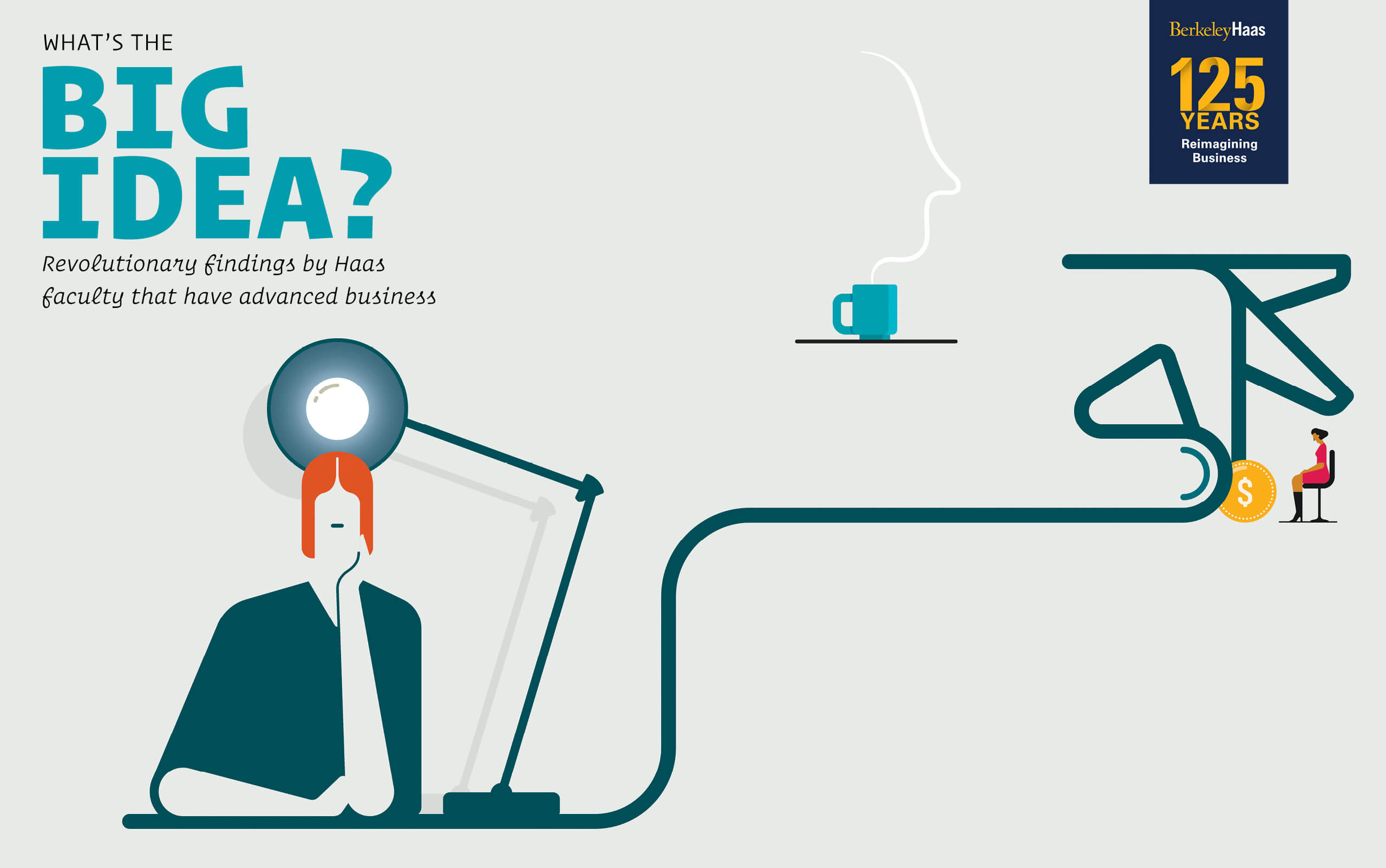Revolutionary findings by Haas faculty that have advanced business
All established wisdom had to start somewhere, often in the form of fresh insights that went on to become common knowledge. Here are some of those big ideas that started at Haas and became deeply embedded in business thinking.
Social Responsibility
Business firms and their leaders should govern with accountability and be socially responsible in their relationships with diverse sectors of society affected by their operations. Leaders failing to do so may eventually lose their leadership roles and see their own organizations collapse.
The late Professor Emeritus Dow Votaw was a pioneer in the field of corporate social responsibility and looked at how corporations evolved amid a society growing increasingly complex.
Wages
Paying workers more than the market wage boosts productivity and morale and reduces turnover.
Professor Emeritus Janet Yellen’s scholarship has focused on a range of issues related to wages, unemployment, and economic cycles. Her most-cited work on “efficiency wages,” written with her husband, George Akerlof, found that businesses offering better pay and better working conditions are often making a wise decision and are rewarded with more productive workers.
Employees
Human assets are as important as the financial and physical assets of a company and need to be managed in a strategic way.
As a scholar, the late Professor Emeritus and former Dean Raymond Miles positioned human resources as a strategic function, defining HR management styles commonly taught today.
NOBEL PRIZE WINNERS
Even in games where players don’t know what their opponents know or what the parameters are, it’s still possible to develop a framework to analyze strategic decision-making.
In 1994, the late Professor John Harsanyi (along with John Nash from Princeton University and Reinhard Selten from Bonn, Germany) won the Nobel Memorial Prize in Economic Sciences for his work in game theory that used probabilities to model how rational people will interact strategically when they have imperfect information. The spark for Harsanyi’s research came from his inability to advise the U.S. Arms Control and Disarmament Agency in 1964 on negotiations with the Soviet Union, because neither side knew much about the other; it was a game of incomplete information. Game theory is now a significant tool for analyzing myriad conflicts, including global political clashes, labor negotiations, and price wars.
Analyzing the boundaries between firms and the markets they operate in is critical to understanding how to best design productive activities.
In 2009, the late Professor Oliver Williamson won a Nobel (along with Elinor Ostrom of Indiana University) for his insights into what’s known as the “make or buy” decision, a way of analyzing whether an organization should contract out for parts or make them in-house. Williamson brought together multiple disciplines to invent the field of transaction cost economics, which sheds light on optimal contracting, the boundaries of the firm, the design of bureaucracies, and more. His work was path-breaking because economic research at the time was focused on market transactions and not what happened inside organizations. Williamson’s insights have influenced everything from electricity deregulation in California to human resource management in the technology industry.
 ORGANIZATIONS & INNOVATION
ORGANIZATIONS & INNOVATION
Natural selection processes akin to those in bioecology drive the emergence, growth, evolution, and decline in groups of related organizations.
This vibrant field of research, called organizational ecology, was co-developed by the late Professor John Freeman and former Professor Glenn Carroll.
Reliable performance by an organization may require a well-developed collective mind in the form of a complex, attentive system tied together by trust.
Professor Emeritus Karlene Roberts pioneered a new way to understand human-made disasters, looking beyond human error and technical glitches to the organizational causes of catastrophes in industries requiring nearly error-free operations, like commercial aviation and nuclear power plants. The quality of interactions among team members, she found, was a critical part of highly reliable organizations.
Knowledge gives companies competitive advantage and is contained within a company’s people.
Ikujiro Nonaka, MBA 68, PhD 72, pioneered theories about knowledge management and transformed how people drive innovation together. Along with Hirotaka Takeuchi, MBA 71, PhD 77, Nonaka co-authored the business best-seller The Knowledge-Creating Company. In 1997, Nonaka became the Haas School’s Xerox Distinguished Professor in Knowledge, the first professorship in the world dedicated to the study of knowledge management.
It isn’t enough for companies to innovate—they also must be able to profit from those ideas. This requires good strategic management and access to manufacturing, marketing, distribution, and other complementary assets and technologies on favorable terms—which is just as important to financial success as great R&D.
Professor David Teece is known for this theory of dynamic capabilities, which puts the management team front and center in the innovation process. Gary Pisano, PhD 88, co-authored the first article on the topic, in 1997.
Companies used to rely on their internal labs for their innovations, but they can retain their competitive edge by partnering with other companies—even competitors—to create useful and lucrative products and services.
This concept, known as open innovation, was created by longtime Adjunct Professor Henry Chesbrough, PhD 97.
Branding
A brand is an asset involving relevance and image (functional and emotional) and having a loyal customer core. The implication is that a brand is the responsibility of the whole organization including the executive suite.
Professor Emeritus David Aaker is widely considered the father of modern branding. His pioneering work defined brand equity and detailed ways to build and manage brands and portfolios that are used by organizations worldwide.
Open Science
Widely accepted research practices in the social sciences leave too much room for bias and manipulation and need to be reformed.
Professor Leif Nelson’s 2011 paper, “False Positive Psychology” (co-authored with Joseph Simmons and Uri Simonsohn), helped launch the open science movement, which has upended the field of psychology, toppled famous studies, and sent waves throughout the social sciences. Open science focuses on rooting out biases, replicating important studies, and—on rare occasions—exposing fraud. Many researchers have since adopted more rigorous practices, and reforms are ongoing.
Culture
Person-culture fit is a useful predictor of organizational commitment and extra-role behavior, which in turn affect firm performance.
Professor Jennifer Chatman, PhD 88, co-created the Organizational Culture Profile in the early 1990s with Charles O’Reilly, MBA 71, PhD 75, and Dave Caldwell. It illustrates how organizational culture can be quantified, has defined the agenda for the scientific study of culture for decades, and remains the most robust and reliable measure of organizational culture to date.
Finance
The balance sheet approach should be used to analyze accounting issues as opposed to the income statement approach.
Articles by the late Professor Maurice Moonitz, BS 33, MS 36, PhD 41, played an important role in the gradual switch to the balance sheet approach by the bodies that establish the generally accepted accounting principles followed by publicly held American corporations. He also influenced the conceptual frameworks eventually adapted by accounting standard setters both in America and abroad.
Securities with various risks and returns can be combined into a mutual fund that mimics the S&P 500.
The concept of a “SuperFund” index, a radical innovation in security markets that paved the way for exchange-traded funds, was developed by Professor Emeritus Nils Hakansson in 1976.
Prior to the Global Financial Crisis that started in 2007, banks were selecting the riskiest pools of home mortgages—the lemons that were more likely to contain mortgages in which borrowers prepaid or defaulted on their loans—to sell into the securitized bond market.
The late Professor Dwight Jaffee, along with Professor Nancy Wallace and Christopher Downing, were the first to document loan cherry-picking by banks and Freddie Mac. Their research drew intense scrutiny from Freddie Mac and helped to pressure the quasi-governmental entity into disclosing more information about underlying mortgages. Jaffee made seminal contributions aimed at influencing the public policy debate on questions related to the causes of the Global Financial Crisis, which he anticipated years before its onset.
Behavioral Economics
Humans tend to remain committed to a losing course of action (think bad investments or relationships) rather than pull the plug and try something different.
Professor Emeritus Barry Staw coined this phenomenon “escalation of commitment,” a discovery that is one of the most highly cited in organizational behavior. He helped pioneer the field of behavioral decision theory, a sub-area of behavioral economics.
Individual experiences of macroeconomic shocks affect financial risk-taking, as often suggested for the generation that experienced the Great Depression.
Professor Ulrike Malmendier proved econometrically what had been observed only anecdotally and has continued her groundbreaking research into how the economic conditions that prevail during a person’s life so far strongly influence their views on money for years and decades to come.
Homeownership
Lending discrimination has not disappeared with the shift online, since algorithms incorporate human biases.
Professors Adair Morse, Richard Stanton, and Nancy Wallace were the first to merge large datasets with details on interest rates, loan terms and performance, property location, and borrower’s credit with race and ethnicity. Their 2021 research found that both online and face-to-face lenders charge higher interest rates to African American and Latino borrowers, and these differentials lead to over $450 million in extra interest payments per year.
 Energy
Energy
Californians have been paying a “mystery gasoline surcharge”—which has ranged from 28 to 65 cents a gallon in any given year—since 2015.
Professor Severin Borenstein discovered this surcharge, finding that between 2015 and 2022, it cost Californians $48 billion—over $4,000 for a family of four. He’s been fighting to get government officials to understand it ever since. Earlier this year, the state legislature and governor passed a bill that will establish a special state office to investigate the cause of the surcharge and possible remedies.
TECHNOLOGY & ENTREPRENEURSHIP
Lack of total transparency limits the liquidity that firm owners can obtain through an IPO.
Professors Emeriti Hayne Leland and David Pyle’s 1976 paper was a seminal contribution in the field of corporate finance, investigating what happens when entrepreneurs cannot be expected to be entirely straightforward about their projects to lenders, since there may be substantial rewards for exaggerating positive qualities.
“Smart markets,” defined as a turbulent, information-intensive environment with constantly changing products, consumers, and competitors, will require a shift in performance goals from profitability per product to profitability per customer.
Professor Rashi Glazer’s trailblazing theory about smart markets—which he first introduced in 1991, years before the Internet boom—positioned Haas as a thought leader in the data-driven marketing movement.
Durable economic principles can guide you in understanding today’s frenetic business environment in information-based products and the technology sector.
Haas Professors Emeriti Carl Shapiro and Hal R. Varian co-authored Information Rules: A Strategic Guide to the Network Economy (1999), a widely acclaimed book that deconstructs the economic factors affecting information technology markets. Though the book pre-dated Facebook, the iPad, and big data, it continues to guide leaders through the information age.
Perception is reality in entrepreneurship.
Professor Toby Stuart has investigated the nuances of how startups build momentum by establishing the right set of affiliations. In building a company, entrepreneurs proactively architect exchange relationships that enhance the legitimacy of their endeavors. His work finds that the more uncertain the prospects of a new venture, the more essential it is to enlist the support of those already held in high esteem in the space.
Despite it seeming easy to shop around online, information gatekeepers design markets so that prices vary widely and are hard to compare.
The late Professor John Morgan was a prolific researcher, with notable contributions to the area of pricing and competition in online markets. His most-cited work sheds light on the reasons that prices can vary so widely on the internet when it’s easy to shop around: So-called “information gatekeepers” have an incentive to design markets in ways that prices across sellers vary.
